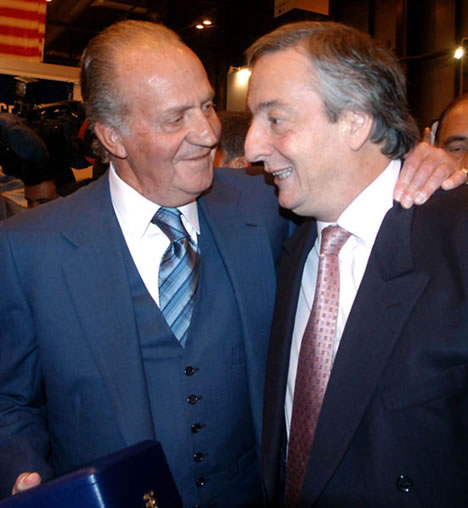next ↑
A snapshot of health care in Europe (1/03/2008)
In Spain, where manger scenes are still the Christmas holidays' major decoration, few feel the need to "put the Christ back in Christmas." (12/23/2007)
Ibérico hams have been approved for sale in the USA for the first time (12/14/2007)
More than 2,000 web developers have gathered for the LeWeb conference (12/12/2007)
Spain's Sinking Property Market May Roil Europe (12/12/2007)
Scientists discover the largest dinosaur site known in Europe (12/10/2007)
Zapatero has vowed to make the environment a priority in the next legislature if the Socialists win what is expected to be a tight election early next year. (12/10/2007)
The world is more than 50% likely to experience dangerous levels of climate change (12/10/2007)
The French and Spanish leaders have confirmed new joint action to combat terrorism (12/09/2007)
Repsol Discovers Natural Gas in Bolivia to Supply 1% of Spain (12/07/2007)
No need for a common EU visa to attract highly skilled workers from outside the EU? (12/07/2007)
Illegal immigration in Spain (12/07/2007)
Spain is reclaiming its costas (12/06/2007)
House-price inflation has dipped in France, Spain, Italy and Belgium (12/06/2007)
Prodi and Zapatero discuss migration (12/05/2007)
Limitations on Endesa's debt service ratio and on Endesa's dividends distribution policy (12/05/2007)
Miguel Angel Moratinos said Spain would prefer that Mr. Mugabe not take part in the European Union-Africa summit (12/04/2007)
Arroyo signed cooperation deals with Spain covering agriculture and fisheries, education, sports and culture (12/03/2007)
A Spanish civil guard has been killed and another badly wounded after being shot by members of the terrorist group Eta (12/01/2007)
The European telecom sector, attractive in these times of turbulent equity (11/29/2007)
Many beauty spots and costa views will be blighted under a plan whereby Spain will displace natural gas with wind turbines as the main source of energy (11/26/2007)
Venezuelan President Hugo Chavez said Monday that reconciliation is impossible with Colombia's president (11/26/2007)
The total cost of the european satellite project is estimated at 3.4 billion euros and is expected to create over 100,000 new jobs in Europe (11/26/2007)
Chinese Vice Premier Hui Liangyu said Monday that China stands ready to boost trade, investment and other ties with Spain (11/26/2007)
Spain targets 8 million broadband (11/26/2007)
Las Vegas in Spain (11/25/2007)
Spain, the greatest European greenhouse gas emitter (11/25/2007)
"The reason Europe lags behind the U.S. in terms of development in general and branded development in particular is the lack of effective regulations and enforcement of those regulations, and we think that's beginning to change" (11/25/2007)
Spanish Civil War: Shadows of War (11/23/2007)
"I don't know if I'm too subjective but I think we have a real chance of getting the Olympics" (11/23/2007)
"This is confirming our policy of boosting relations with West Africa" (11/22/2007)
Spanish actor Fernando Fernan-Gomez dies at 86 (11/22/2007)
Europe's stimulant drug of choice (11/22/2007)
Telefonica wants mexican regulators to force Telmex and Telcel to connect rivals to their networks on non-discriminatory terms (11/22/2007)
Spain to trim its 2008 growth estimate (11/22/2007)
A deflating housing bubble has global finance players moving in to scoop up dud loans on the cheap (11/21/2007)
President Hugo Chavez said Tuesday he hopes a spat with Spanish King Juan Carlos doesn't spiral into a diplomatic crisis but that Venezuela doesn't need Spanish investment (11/13/2007)
Venezuelan President Hugo Chavez demanded on Tuesday Spain's king apologize for telling him to shut up, warning that Spanish investments could suffer in its former colony because of the spat (11/13/2007)
"The changes the Commission is presenting today in the telecoms rules is bound to revolutionize the European telecoms sector" (11/13/2007)
Venezuelan President Hugo Chavez joked with a reporter on Tuesday to "shut up" asking questions (11/13/2007)
Alcoholism in Europe (11/13/2007)
Two Spanish cartoonists have been found guilty of offending the royal family and fined 3,000 euros each (11/13/2007)
"I think it's imprudent for a king to shout at a president to shut up. Mr King, we are not going to shut up" (11/13/2007)
Spain's King Tells Venezuela's Chavez to "Shut Up" (11/10/2007)
Spain moved to soothe diplomatic tensions with Morocco on Monday as the Spanish king and queen began a visit to two territories on the coast of North Africa that both countries claim (11/06/2007)
As a nucleus of the electronic music scene, Ibiza attracts party people of every age and demographic (11/04/2007)
The Spanish National Court on Wednesday convicted three men of murdering 191 people and wounding more than 1,800 in the 2004 Madrid bombings (11/01/2007)
Giant hyenas, sabretoothed cats, giraffes and zebras lived side by side in Europe 1.8 million years ago (10/31/2007)
"Amnesty is one thing, but amnesia is another" (10/28/2007)
Thirty men are currently on trial in Madrid on charges related to a suspected plot to blow up the Spanish high court and political landmarks (10/25/2007)
Starting a newspaper in a mature economy these days: An act of folly? (10/22/2007)
Irish role in the fight against Franco on the side of Spain's ousted republican government was marked in Belfast (10/15/2007)
Controversy in Spain Over Royal Family (10/13/2007)
The Age of Discovery has discovered DNA (10/08/2007)
The consortium's mostly cash offer for ABN Amro of the Netherlands, is 72 billion euros (10/06/2007)
previous ↓





